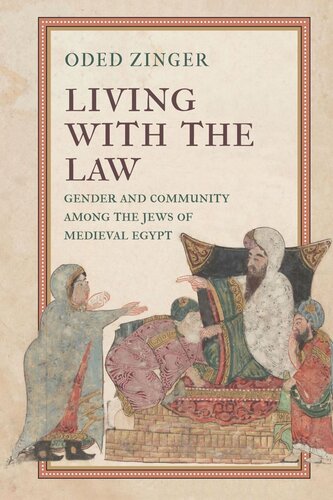

Most ebook files are in PDF format, so you can easily read them using various software such as Foxit Reader or directly on the Google Chrome browser.
Some ebook files are released by publishers in other formats such as .awz, .mobi, .epub, .fb2, etc. You may need to install specific software to read these formats on mobile/PC, such as Calibre.
Please read the tutorial at this link: https://ebookbell.com/faq
We offer FREE conversion to the popular formats you request; however, this may take some time. Therefore, right after payment, please email us, and we will try to provide the service as quickly as possible.
For some exceptional file formats or broken links (if any), please refrain from opening any disputes. Instead, email us first, and we will try to assist within a maximum of 6 hours.
EbookBell Team

0.0
0 reviewsLiving with the Law explores the marital disputes of Jews in medieval Islamic Egypt (1000–1250), and considers how ordinary Jews, especially women, experienced communal life under Islam and Jewish law. Oded Zinger concludes that the maintenance of a network of social relations with men protected women at different stages of their lives.
Living with the Law explores the marital disputes of Jews in medieval Islamic Egypt (1000–1250), relating medieval gossip, marital woes, and the voices of men and women of a world long gone. Probing the rich documents of the Cairo Geniza, a unique repository of discarded paper discovered in Cairo synagogue, the book recovers the life stories of Jewish women and men working through their marital problems at home, with their families, in the streets of old Cairo and in Jewish and Muslim courts. Despite a voluminous literature on Jewish law, the everyday practice of Jewish courts has only recently begun to be investigated systematically. The experiences of those at a legal, social, and cultural disadvantage allow us to go beyond the image propagated by legal institutions and offer a view “from below” of Jewish communal life and Jewish law as it was lived.
Examining the interactions between gender and law in medieval Jewish communities under Islamic rule, Oded Zinger considers how women experienced Jewish courts and the pressure they were under to relinquish their monetary rights at court and at home. The tactics with which women countered this pressure, ranging from exploiting family ties to appealing to Muslim courts, expose the complex relationship between individual agency, gendered expectations, and communal authority. Zinger concludes that more than money, education, or lineage, it was the maintenance of a supportive network of social relations with men that protected women at different stages of their lives.